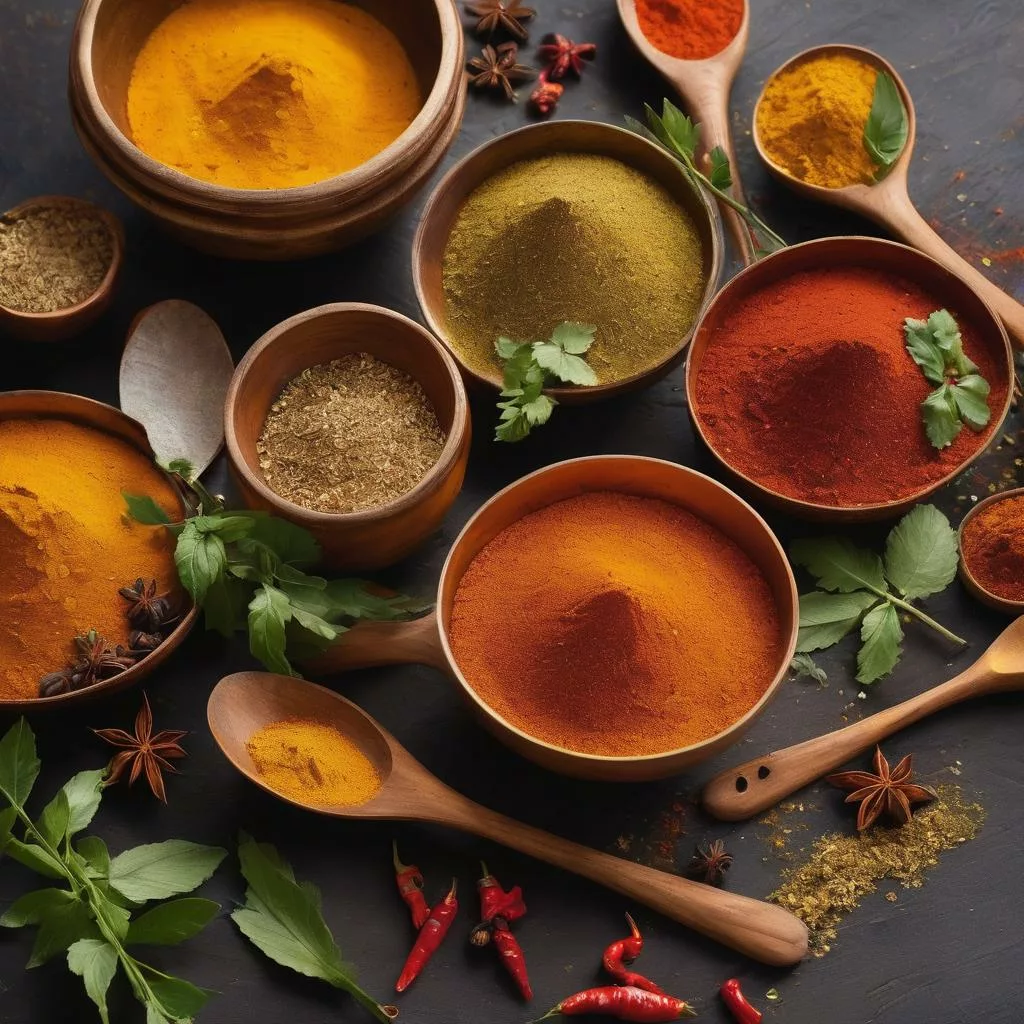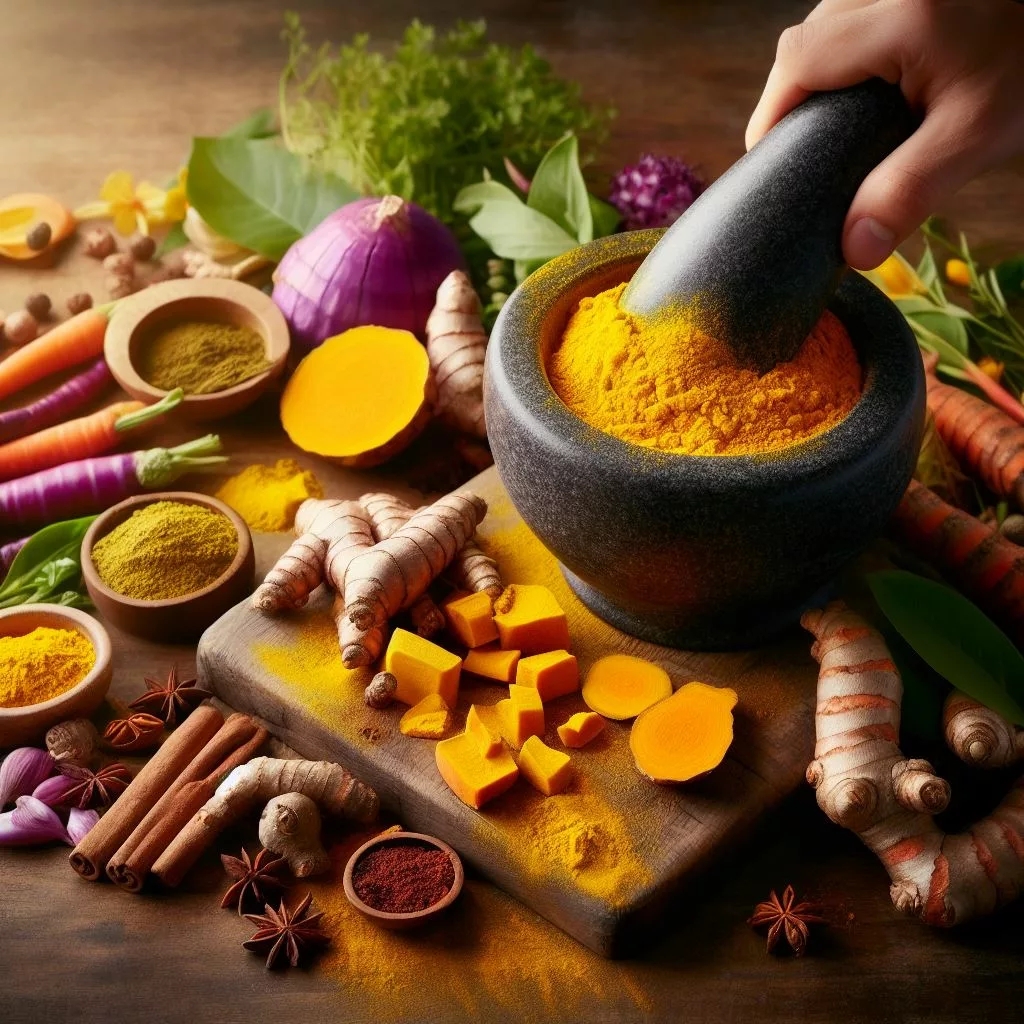
Are you tired of suffering from chronic inflammation? Discover the anti-inflammatory wonders of turmeric, a golden spice that has been used for centuries. Imagine finding a natural solution to ease your discomfort and improve your overall well-being. In this article, we will debunk common myths and reveal the science behind turmeric’s anti-inflammatory properties. By incorporating turmeric into your daily routine, you can experience long-term relief from inflammation. Say goodbye to relying on medications and embrace the power of this ancient spice.
Key Takeaways
- Turmeric’s active compound, curcumin, has anti-inflammatory properties and can reduce markers of inflammation in conditions like rheumatoid arthritis.
- Consuming turmeric with black pepper or a source of fat can enhance curcumin absorption, increasing its effectiveness.
- Turmeric has shown promising results in managing autoimmune diseases and reducing joint pain in conditions like osteoarthritis.
- Turmeric’s anti-inflammatory action is attributed to its ability to inhibit enzymes and molecules involved in the inflammatory response, targeting multiple pathways.
The Science Behind Turmeric’s Anti-Inflammatory Properties
Turmeric Smoothie For Weight Loss: Number 1 Natural Option
Discover the scientific evidence behind turmeric’s anti-inflammatory properties. Research on curcumin, the active compound in turmeric, has demonstrated its potential as a powerful anti-inflammatory agent. Numerous studies have focused on curcumin’s ability to modulate inflammatory pathways in the body, leading to reduced inflammation and pain.
One study published in the Journal of Alternative and Complementary Medicine found that curcumin supplementation significantly reduced markers of inflammation in patients with rheumatoid arthritis. Another study conducted at the University of California, Los Angeles, showed that curcumin inhibited the production of inflammatory cytokines, which play a crucial role in the development of chronic inflammation.
Check out the nutritional benefits of flaxseed and how they can improve your health tremendously.
In addition to its direct anti-inflammatory effects, curcumin has also been shown to have antioxidant properties. Oxidative stress is known to contribute to chronic inflammation, and curcumin’s ability to neutralize free radicals helps combat this process.
When it comes to turmeric supplements, it’s important to choose a high-quality product that contains a standardized amount of curcumin. Look for supplements that have undergone third-party testing to ensure purity and potency.
While the scientific evidence supporting turmeric’s anti-inflammatory properties is promising, it’s important to note that more research is needed to fully understand its mechanisms of action and optimal dosage. As always, consult with a healthcare professional before starting any new supplement regimen.
Investigative Science:
- Turmeric Unveiled: Exploring the Golden Spice’s Health Benefits and Culinary, By Tresno Saras, Tiram Media, 2023
- Rushikesh Tukaram Chavan and Dr. Rahul Vinayak Salve, The Pharma Innovation Journal, https://doi.org/10.22271/tpi.2023.v12.i5ab.20203
Exploring the Curcumin Content in Turmeric
You must be aware of turmeric’s curcumin content in order to fully appreciate its health benefits. The active ingredient in turmeric, curcumin, is what gives it many health advantages, including its ability to reduce inflammation. But it is crucial to remember that the body has difficulty absorbing the curcumin found in turmeric. Curcumin is actually poorly absorbed and rapidly metabolized by the liver due to its low bioavailability.
Turmeric is often taken with black pepper to improve the absorption of curcumin. Piperine, a substance found in black pepper, has been demonstrated to uptake curcumin by up to 2,000%. Furthermore, ingesting turmeric along with a fat source, like olive or coconut oil, may enhance the absorption of curcumin.
Turmeric supplements are available for those who want to consume more curcumin. The concentration of curcumin in these supplements is usually higher than in turmeric powder, which facilitates the achievement of therapeutic levels. However, before beginning any new supplement regimen, it is crucial to select a reliable brand and speak with a medical professional.
Research in Science:
- Zulfiqar Ali , Muhammad Saleem , Babar Manzoor Atta , Sadaf S. Khan , Agricultural and Biophotonics Division, National Institute of Lasers and Optronics (NILOP), Lehtrar Road, Islamabad, Pakistan,
- Poorva Sharma, Piyush Kashyap and Akshay Dhakane, Google scholar, Published online: 02 Jan 2023
What the Research Says About Turmeric vs. Common Inflammatory Conditions
Here’s what the research says about turmeric’s effectiveness in treating common inflammatory conditions. Turmeric’s active ingredient, curcumin, has been researched for its potential use in treating autoimmune diseases and joint pain, among other inflammatory conditions.

Autoimmune diseases occur when the immune system mistakenly attacks healthy cells in the body. Research suggests that turmeric may help reduce inflammation associated with autoimmune diseases.
A study published in the Journal of Clinical Immunology found that curcumin can modulate the immune response and suppress the production of inflammatory molecules. However, more research is needed to fully understand the effects of turmeric on specific autoimmune diseases.
Turmeric has demonstrated encouraging effects in the treatment of joint pain. Following a thorough analysis of multiple studies, a systematic review published in the Journal of Medicinal Food concluded that supplementing with curcumin can lessen pain and enhance physical function in people suffering from osteoarthritis, a common joint disorder. Furthermore, a study that was published in the Journal of Alternative and Complementary Medicine discovered that patients with osteoarthritis in their knees experienced less pain and better physical function when curcumin and Boswellia serrata extract were combined.
Although the evidence regarding turmeric’s potential benefits for common inflammatory conditions is encouraging, it is crucial to remember that each person’s reaction may be different. It is advised to speak with a healthcare provider before using supplements containing turmeric or curcumin.
Scientific Research:
- Julie S* Jurenka, MT(ASCP), Google scholar, Alternative Medicine Review Volume 14, Number 2 2009
- Ying Peng, Mingyue Ao, Baohua Dong, Google Scholar, Published online: 30 Sep 2022, https://doi.org/10.2147/DDDT.S327378
Unveiling the Mechanisms of Turmeric’s Anti-Inflammatory Action
You can learn more about turmeric’s potential advantages for lowering inflammation in the body by comprehending the mechanisms underlying its anti-inflammatory action. To understand these mechanisms and provide insight into how turmeric reduces inflammation, scientific research has been done.
A substance called curcumin, which has been thoroughly researched for its anti-inflammatory qualities, is one of the main ingredients of turmeric. It is well known that curcumin inhibits the activity of several molecules and enzymes that are involved in the inflammatory response, such as lipoxygenase (LOX), nuclear factor-kappa B (NF-κB), and cyclooxygenase-2 (COX-2). These compounds and enzymes are crucial for the body’s synthesis of inflammatory mediators.
To highlight the ways in which turmeric reduces inflammation, let us look at the following table:
| Mechanism | Description |
|---|---|
| Inhibition of COX-2 | Curcumin inhibits the activity of COX-2, an enzyme involved in the production of inflammatory prostaglandins. |
| Inhibition of LOX | Curcumin also inhibits the activity of LOX, an enzyme that produces inflammatory leukotrienes. |
| Suppression of NF-κB | NF-κB is a transcription factor that regulates the expression of genes involved in inflammation. Curcumin suppresses NF-κB activity, thereby reducing inflammation. |
These mechanisms, among others, contribute to turmeric’s ability to modulate the inflammatory response in the body. By targeting multiple pathways involved in inflammation, turmeric offers a holistic approach to reducing inflammation and may have potential therapeutic benefits for various inflammatory conditions.
Scientific Research:
- Harsha Mysore Rajagopal, Srikanta Belagihalli Manjegowda , Chandraprakash Serkad, Shylaja Mallaiah Dharmesh, google scholar, 15 October 2018
- Fariba Ghiamati Yazdi, Sabihe Soleimanian-Zad, Edwin van den Worm & Gert Folkerts, Published: , Springer Nature
Debunking Common Myths About Turmeric’s Anti-Inflammatory Benefits
Do not believe common misconceptions about turmeric’s anti-inflammatory properties. Even though turmeric is well known for its ability to lower inflammation, it is important to distinguish reality from fiction. Let us talk about two myths surrounding turmeric: how it affects gut health and how it helps with chronic pain.
First, there is a belief that turmeric can cause gastrointestinal issues or worsen existing gut conditions. However, scientific research suggests otherwise. In fact, turmeric has been found to have a positive impact on gut health. Its active compound, curcumin, has been shown to reduce gut inflammation and improve gut barrier function. Furthermore, curcumin has shown promise in reducing the symptoms of illnesses like inflammatory bowel disease (IBD) and irritable bowel syndrome (IBS).
Secondly, turmeric is a popular natural treatment for persistent pain. It is not a panacea, even though its anti-inflammatory qualities can aid in the management of pain. Turmeric has a slight pain-relieving effect, and the effects might differ from person to person and from condition to condition. Seeking advice from a medical expert is crucial for a thorough pain management strategy.
Investigative Science:
- Markiesha Baines, Arifbillah Sarowar, Saachi Mittal, Meaghan Osborne, Wayne State University, 4-1-2023
Turmeric: A Natural Alternative to Anti-Inflammatory Medications

Looking for a natural alternative to anti-inflammatory medications? Turmeric may be the answer. Scientific evidence supports the anti-inflammatory properties of turmeric, thanks to its active compound called curcumin. Numerous studies have shown that curcumin can help reduce inflammation in the body. However, it’s important to note that turmeric may have potential side effects, especially when consumed in large amounts or used in combination with certain medications.
Turmeric Vs Medication
In just a few weeks, you’ll discover how turmeric can be a natural alternative to anti-inflammatory medications. Turmeric has gained popularity in recent years due to its potential health benefits, particularly its anti-inflammatory properties. While anti-inflammatory medications can be effective in managing inflammation, they often come with side effects and long-term risks. Turmeric, on the other hand, is a natural spice that has been used for centuries in traditional medicine. It contains a compound called curcumin, which has been shown to have anti-inflammatory effects. This makes turmeric a promising option as a preventive measure or complementary therapy for various inflammatory conditions.
To further highlight the benefits of turmeric, let’s compare it to anti-inflammatory medications in the table below:
| Turmeric | Anti-Inflammatory Medications | |
|---|---|---|
| Effectiveness | Studies suggest that turmeric may be as effective as certain anti-inflammatory medications in reducing inflammation. | Anti-inflammatory medications are known to be effective in managing inflammation. |
| Side Effects | Turmeric is generally considered safe, but high doses may cause stomach upset or interact with certain medications. | Anti-inflammatory medications can cause side effects such as stomach ulcers, heartburn, and increased risk of bleeding. |
| Long-Term Risks | Turmeric is a natural spice and is unlikely to have long-term risks when consumed in moderation. | Long-term use of anti-inflammatory medications may increase the risk of cardiovascular events and gastrointestinal bleeding. |
While turmeric shows promise as a natural alternative to anti-inflammatory medications, it is important to consult with a healthcare professional before making any changes to your medication regimen. They can provide personalized advice based on your specific health needs.
Scientific Proof for the Benefits of Turmeric
If you’re curious about the scientific evidence supporting turmeric as a natural alternative to anti-inflammatory medications, let’s explore the research together. Numerous clinical studies have delved into the potential benefits of turmeric in reducing inflammation. One key factor to consider is turmeric’s bioavailability, which refers to its ability to be absorbed and utilized by the body. According to research, combining turmeric with black pepper or fats like coconut oil can increase its bioavailability, which improves absorption and efficacy. Furthermore, research has shown that curcumin, the active ingredient in turmeric, has anti-inflammatory qualities that may even match those of some prescription drugs. It is crucial to remember that additional study is required to completely comprehend the mechanisms and ideal dosages of turmeric for anti-inflammatory effects. However, the research that is currently available indicates that turmeric may offer a promising natural substitute for prescription anti-inflammatory drugs.
Potential Side Effects?
You might be wondering, are there any potential side effects of using turmeric as a natural alternative to anti-inflammatory medications? While turmeric is generally considered safe for most people when used in moderation, there are a few potential risks to be aware of.
Firstly, high doses of turmeric may cause gastrointestinal issues such as stomach upset, diarrhea, or nausea. It can also interact with certain medications, including blood thinners, diabetes drugs, and stomach acid reducing medications. If you are taking any of these medications, it’s important to consult with your healthcare provider before adding turmeric to your regimen.
Additionally, some individuals may be allergic to turmeric, experiencing symptoms like skin rashes, itching, or difficulty breathing. If you notice any adverse reactions after consuming turmeric, discontinue use and seek medical attention.
In terms of dosage guidelines, the World Health Organization (WHO) suggests a maximum intake of 3 mg/kg body weight per day of curcumin, the active compound in turmeric. However, it’s important to note that individual tolerance may vary, and it’s always best to start with a lower dose and gradually increase if needed.
Incorporating Turmeric Into Your Daily Routine for Long-Term Inflammation Relief
If you’re looking to incorporate turmeric into your daily routine for long-term inflammation relief, it’s important to understand the recommended dosage. While there is no one-size-fits-all approach, experts suggest consuming about 1-3 grams of turmeric per day to experience its potential benefits. Turmeric contains a compound called curcumin, which has been extensively studied for its anti-inflammatory properties, making it a promising natural alternative for managing chronic inflammation.
Turmeric Dosage Recommendations
To experience the long-term benefits of turmeric’s anti-inflammatory properties, incorporate a daily dosage of one teaspoon into your routine. Turmeric has been found to be effective in reducing inflammation in the body, thanks to its active compound called curcumin. However, it’s important to note that the effectiveness of turmeric dosage may vary from person to person. Some individuals may experience significant relief with a lower dosage, while others may require a higher dosage to achieve the desired results. When it comes to safety, turmeric is generally considered safe when consumed in moderate amounts. However, high doses or prolonged use may lead to gastrointestinal issues in some individuals. It is always recommended to consult with a healthcare professional before starting any new supplement or making significant changes to your daily routine.
Benefits of Turmeric
To effectively incorporate turmeric into your daily routine for long-term inflammation relief, start by adding a teaspoon of this golden spice to your meals or beverages. Turmeric has been used for centuries in traditional medicine and is known for its anti-inflammatory properties. By incorporating turmeric into your diet, you may experience a reduction in chronic inflammation and associated symptoms. In addition to its anti-inflammatory benefits, turmeric also has antioxidant properties, which can help protect your cells from damage caused by free radicals. To make the most out of turmeric’s benefits, you can try adding it to various recipes such as curries, soups, smoothies, or even golden milk. If you find it difficult to incorporate turmeric into your meals, you can also consider turmeric supplements, which are available in capsule or powder form. Remember to consult with your healthcare provider before starting any new supplement regimen.
Scientific Research:
- Bharat B. Aggarwal, Anushree Kumar, Manoj S. Aggarwal, and Shishir Shishodia, Google scholar, https://www.curcumin.co.nz/pdf/Curcumin_A_Spice_For_All_Seasons.pdf
Frequently Asked Questions
How Much Turmeric Should I Consume Daily for Its Anti-Inflammatory Benefits?
You should consume around 500-2000 milligrams of turmeric daily for its anti-inflammatory benefits. This can be achieved through turmeric supplements or by adding turmeric to your meals.
Can Turmeric Help With Specific Conditions Like Arthritis or Inflammatory Bowel Disease?
Turmeric can be beneficial for conditions like arthritis and inflammatory bowel disease. Studies suggest its anti-inflammatory properties may help reduce symptoms. Furthermore, turmeric has shown potential in supporting cardiovascular health and improving certain skin conditions.
Are There Any Side Effects or Potential Risks Associated With Turmeric Consumption?
Potential side effects of turmeric consumption include stomach upset and dizziness. It may also interact with certain medications, like blood thinners. It’s important to consult with your healthcare provider before adding turmeric to your diet.
Can Turmeric Be Used as a Standalone Treatment for Inflammation, or Should It Be Combined With Other Remedies?
Can turmeric alone treat inflammation or should it be combined with other remedies? To effectively reduce inflammation, it is recommended to use turmeric in combination with other therapies, as the dosage alone may not provide optimal results.
Are There Any Specific Guidelines or Precautions to Follow When Using Turmeric as an Anti-Inflammatory Remedy?
When using turmeric as an anti-inflammatory remedy, there are precautions and dosage guidelines to follow. It is important to consult with a healthcare professional to determine the appropriate amount and any potential risks.
Conclusion
In conclusion, because of its high curcumin content, turmeric has been scientifically shown to have potent anti-inflammatory properties. Research has shown that curcumin can effectively combat common inflammatory conditions like arthritis and inflammatory bowel disease. Turmeric’s capacity to block different inflammatory pathways in the body is another factor contributing to its anti-inflammatory properties. Despite widespread misconceptions, scientific research backs up the health benefits of turmeric, which can serve as a natural substitute for prescription anti-inflammatory drugs. Including turmeric in your diet on a regular basis can help reduce inflammation over time. Curcumin makes up about 20% of the weight of turmeric, did you know that?

